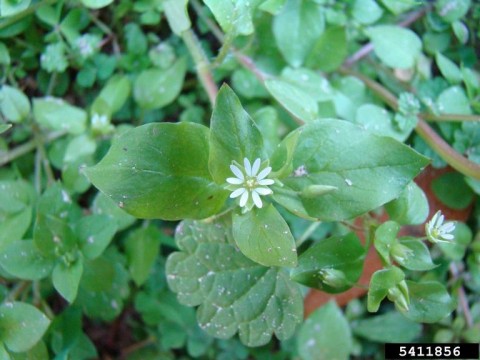
Pull winter weeds, such as chickweed, now when they’re small and easy to control. Photo: Rebekah D. Wallace, University of Georgia, Bugwood.org.
Cleaning up your garden now will make your plants healthier next year. If you can prevent pests, diseases and weed seeds from overwintering, you’ll have a head start next year. And you’ll have less work to do if you can prevent problems before they start.
Weeds, fallen leaves and fruit, dead plants, and dead or diseased branches are ideal places for pests and diseases to harbor. Cleaning these up will go a long way toward reducing next year’s problems.
Here are some steps you should take.
Pull weeds so they don’t have an opportunity to spread. In western Washington, we have a number of weed species that sprout and grow during the winter.
Pull weeds when they are small, before they can grow and set seed. If you have existing weeds that have already matured and set seed, remove and dispose of them carefully to avoid spreading seeds.
Rake up old leaves, plant debris and dead plants. This removes hiding places for overwintering insects. It also removes fungal spores, so they won’t infect new plants in the spring.
Most leaves can be used in garden beds as mulch or added to your compost bin. The exception is leaves from trees with a foliar disease. See last week’s blog post for more details.
Prune dead, diseased and overlapping branches on your trees and shrubs in late fall. This will create strong structure and minimize the potential for winter storm damage. Call us if you would like us to prune your trees or shrubs. We have ISA Certified Arborists on staff.
Pull vegetable plants that are no longer bearing. Healthy material can go in a compost bin if you have one. If you suspect disease, dispose of the material in the yard waste bin at the curb.
If you have fruit trees, clean up all fruit that has fallen or is still on the tree.
Pick up debris such as boards or bricks. They provide great shelter for slugs, snails and other garden pests.
Mulch garden beds to protect them from winter weather and to reduce open space for weeds to grow. Be sure to leave several inches with no mulch around the trunks of trees and shrubs.
Take care of your tools and equipment too.
- Clean soil off your garden tools. Apply a thin film of oil before storing them.
- Clean and sharpen pruners and mower blades. Sharp tools provide cleaner cuts, helping keep plants healthy.
